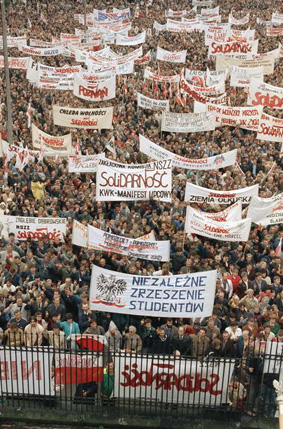 |
Peoples' movements and protests |
 |
|
Mobilizations16-17 century piracyThe slave uprising in HaitiThe Chartists1848The First internationalThe Social Democratic PartyThe Revolutions 1917-19General strike in Hong Kong 1925-26The occupation of FlintThe welfare statePeronismThe boom of the 60s-70s in EuropeSolidarnoscThe metal strike in São PauloThe Hyundai strikeBack to Labour MovementsBack to main page |
Solidarnosc
Poland was one of the countries that borrowed money to invest in modern industry in the 1970s. The modernization succeeded decently, but in connection with the so-called debt crisis, Poland became the first country to be affected. As in all other indebted countries, the government tried to get the direct producers to pay. But resistance to this became unusually effective, due to the fact that there was a clear enemy to mobilize against: the state, which controlled both industry and austerity. The most combative workers in Poland were found at the shipyards of Gdansk and Gdynia; they had defended the standard of living and overthrown governments as early as the 1960s. They went on strike on 14 August 1980 to protect their trade union rights, which were threatened with dismissal of trade union organizers. The strike spread quickly throughout Poland and the all-encompassing trade union Solidarity was formed after just four days. Since the same organization accommodated everyone except the regime, it soon began to address all kinds of issues, and since it also included the middle class, it soon became middle class issues that prevailed – especially after a military coup had thwarted labor mobilization and middle class organizers could count on US intelligence. In a short time, Solidarity became primarily a nationalist organization aimed at liberation from Russian control. The coupling of national requirements to material ones, on the other hand, made the movement very successful. It actively contributed to the fall of the Soviet empire, and to Poland being one of the best-performing Eastern European countries after 1990 – Poland had greater popular control over profiteers than many other countries in the former Soviet empire. Reading
|
